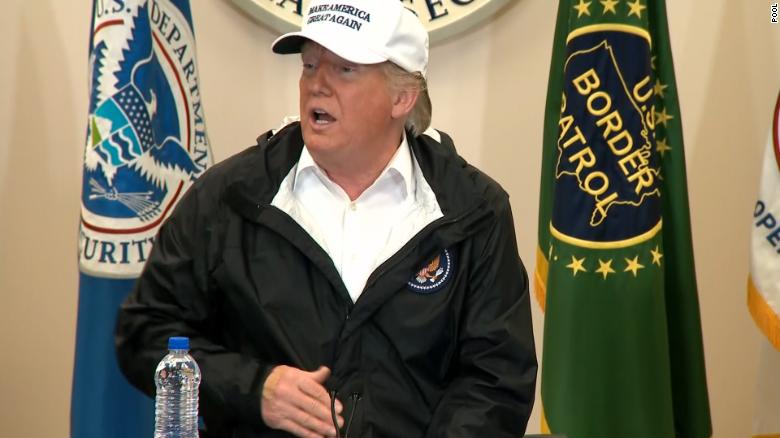Exclusive: White House preparing draft national emergency order, has identified $7 billion for wall
The White House is preparing a draft proclamation for President Donald Trump to declare a national emergency along the southern border and has identified more than $7 billion in potential funds for his signature border wall should he go that route, according to internal documents reviewed by CNN.
Trump has not ruled out using his authority to declare a national emergency and direct the Defense Department to construct a border wall as Congress and the White House fight over a deal to end the government shutdown. But while Trump's advisers remain divided on the issue, the White House has been moving forward with alternative plans that would bypass Congress.
"The massive amount of aliens who unlawfully enter the United States each day is a direct threat to the safety and security of our nation and constitutes a national emergency," a draft of a presidential proclamation reads.
"Now, therefore, I, Donald J. Trump, by the authority vested in me by the Constitution and the laws of the United States of America, including the National Emergencies Act (50 U.S.C 1601, et seq.), hereby declare that a national emergency exists at the southern border of the United States," the draft adds.
The draft was updated as recently as last week, a US government official told CNN.
RELATED: Senate blocks competing proposals to reopen government
According to options being considered, the administration could pull: $681 million from Treasury forfeiture funds, $3.6 billion in military construction, $3 billion in Pentagon civil works funds, and $200 million in Department of Homeland Security funds, the official said.
As lawmakers discussed a short-term measure to fund the government Thursday, Trump again raised the prospect of other ways to fund a border wall without congressional approval.
"I have other alternatives if I have to and I'll use those alternatives if I have to," he told reporters.
"A lot of people who wants this to happen. The military wants this to happen. This is a virtual invasion of our country," Trump said.
The Defense Department referred a request for comment from CNN to the White House.
If the declaration is made, the US Army Corps of Engineers would be deployed to construct the wall, some of which could be built on private property and would therefore require the administration to seize the land, which is permitted if it's for public use.
Trump aides keep telling struggling workers to suck it up
The administration's plans acknowledge the possibility for lawsuits if they move forward with acquiring private property. The documents also reflect a sense of urgency with administration plans, noting that environmental reviews can be skipped and DHS can use waivers to bypass contracting laws.
If the President proceeds with the declaration, it'll likely be challenged in court and by Democrats in Congress, as critics have argued that Trump cannot use the national emergency authority to free up taxpayer funds and build the border wall he has long promised his political supporters.
The question of legality and court challenges is still one of the main hang-ups in using executive action to secure the wall funding. Trump's advisers have cautioned that taking that route would lead to certain legal challenge, meaning the wall construction would still be delayed.
The draft document cites Title 10 of the US Code, which allows Trump to unlock a stash of Pentagon funds that are earmarked but have no signed contracts for spending that money. That would give the President authority to pull from military construction funds and civil works projects, like infrastructure repair projects.
Rep. Dan Crenshaw, R-Texas, tweeted earlier this month that acting White House Chief of Staff Mick Mulvaney, "assured Texans that he understood the deep concerns about using Harvey relief funds for the border." CNN previously reported that the Pentagon was asked to provide a list of those projects in anticipation of a national emergency.
The Pentagon has assisted the Department of Homeland Security in the past. For example, the Army Corps of Engineers, a federal agency within DOD that provides public engineering services, has helped evaluate prototypes of the border wall.
CNN Poll of Polls: Trump approval takes a hit mid-shutdown
Options under consideration conceded that acquiring private property would take time. Even if voluntary, the land could take up to a year to be acquired. Land condemnation cases are known to take time because property owners have the right to sue. A national emergency declaration would not speed that process up, a government official says.
Customs and Border Protection has said that it would consider eminent domain in the future.
"It is always CBP's preference to acquire property through a voluntary, negotiated sale. The Government will attempt to negotiate an offer to sell using survey data and value estimates gleaned from the surveying process," reads an excerpt in a border wall Q&A on their site. "The Government will attempt to negotiate an offer to sell before moving forward with exercising eminent domain. However, if the Government and landowner are unable to reach a negotiated sale or if the Government is unable to obtain clean title, the Government will need to file an eminent domain action."
News Courtesy: www.cnn.com













